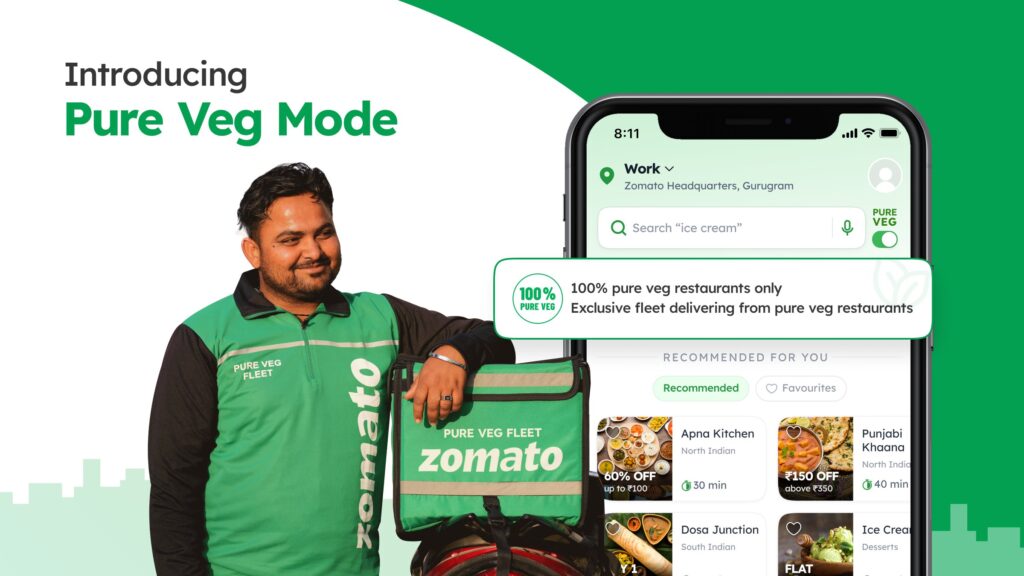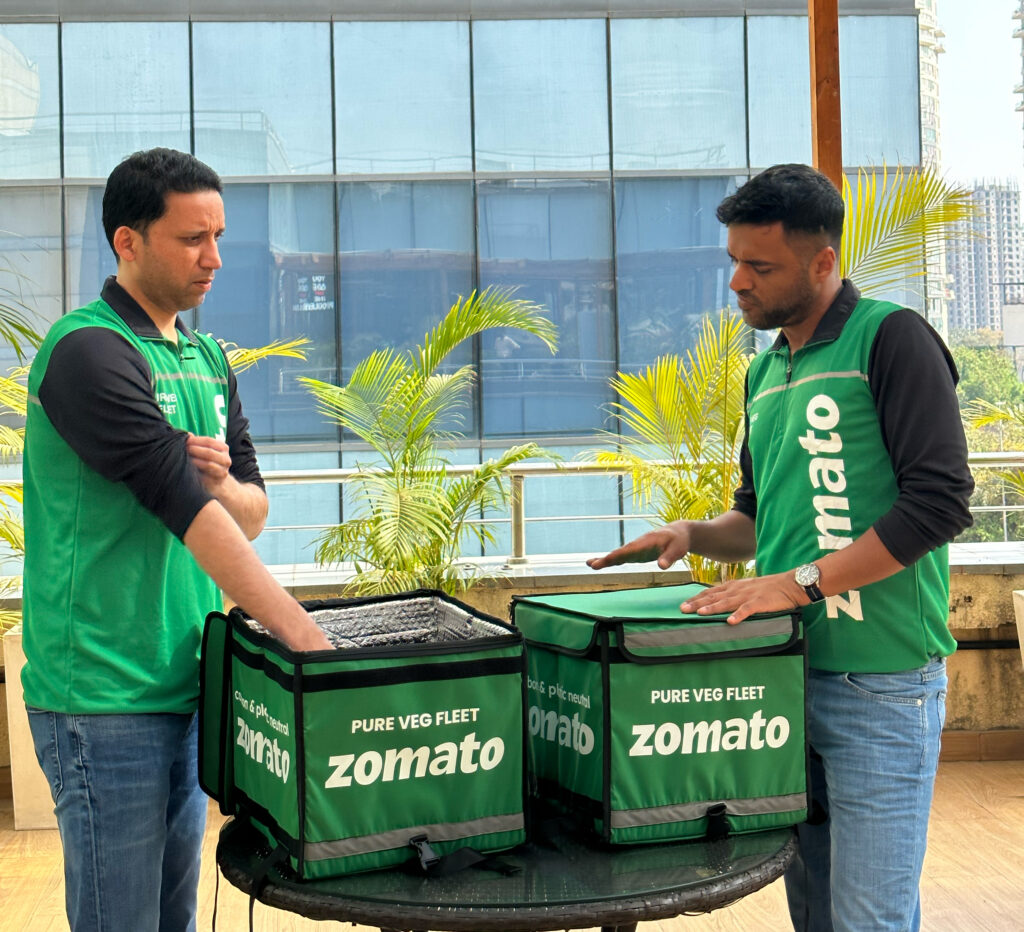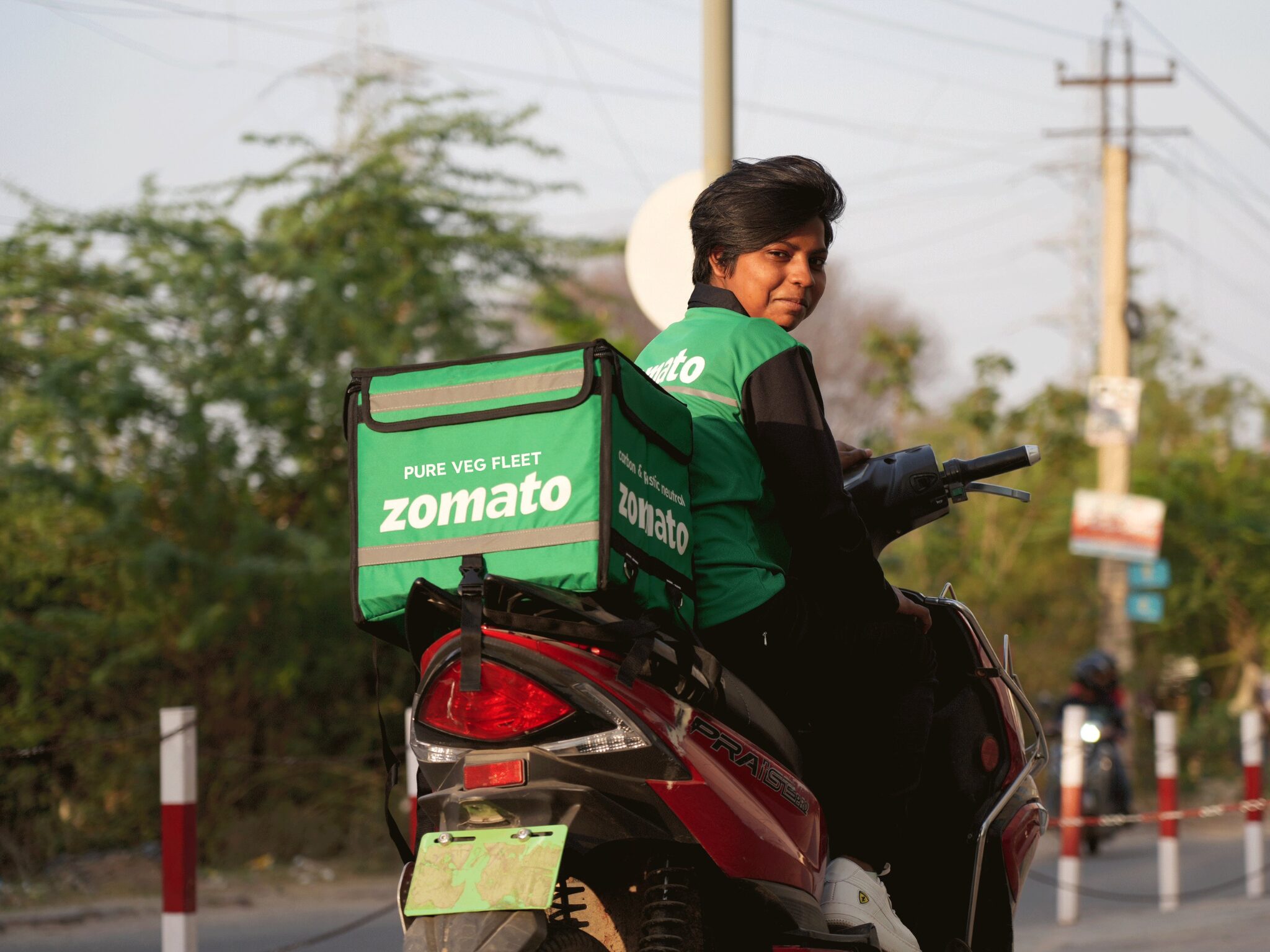The Pure Veg U-Turn: The Zomato Debacle That Divided the World’s Largest Vegetarian Minority
8 Mins Read
This week, Indian food delivery service Zomato launched a Pure Veg Mode in its app for people to order from 100% vegetarian restaurants – but it has sparked intense debate about casteism and religious discrimination after announcing a separate Pure Veg Fleet of drivers wearing green uniforms.
In 2019, Zomato took a stand. Responding to a Hindu man who refused a takeaway because the food delivery app’s driver happened to be Muslim, it tweeted: “Food doesn’t have a religion. It is a religion.”
Its founder Deepinder Goyal further explained that stance in a separate tweet. “We are proud of the idea of India – and the diversity of our esteemed customers and partners. We aren’t sorry to lose any business that comes in the way of our values,” he said.
But this week, Zomato was on the receiving end of pushback from the same customers who praised it five years ago. Goyal had announced a new Pure Veg Mode on the delivery service’s app in an attempt to appeal to the millions of vegetarian Indians who don’t eat from restaurants that also serve meat or eggs.
The real bit of controversy, though, stemmed from the announcement that orders made through this new mode would be delivered by a Pure Veg Fleet, which involved drivers wearing green uniforms – instead of the usual red – to signal that they are only delivering from exclusively vegetarian restaurants and tell them apart from drivers who were delivering food from all restaurants. (In India, vegetarian products are labelled with a green dot, while non-vegetarian foods – including anything containing eggs – are marked with a red one).
Less than 24 hours later after the first announcement, Zomato backtracked on the green uniforms after facing intense backlash from consumers online. Here’s what happened, and why.
Why Zomato rolled out its Pure Veg Mode
On Tuesday, Goyal announced on Twitter/X that given the prevalence of vegetarianism in India – while estimates vary, it has the highest number of vegetarians in absolute numbers globally – one of the most important pieces of feedback Zomato had received was that these customers are “very particular” about how their food is cooked and handled.
Zomato was launching the Pure Veg Mode and Fleet to “solve for their dietary preferences”, he said. “Pure Veg Mode will consist of a curation of restaurants that serve only pure vegetarian food, and will exclude all restaurants which serve any non-veg food item,” he explained. “Our dedicated Pure Veg Fleet will only serve orders from these pure veg restaurants. This means that a non-veg meal, or even a veg meal served by a non-veg restaurant will never go inside the green delivery box meant for our Pure Veg Fleet.”
He went on to explain that the company will introduce a phased rollout in the next few weeks, and plans to add more specialised fleets – such as cake deliveries with hydraulic balancers to prevent cakes from getting smudged – in the future. “We remain committed to listening to our customers, and serving our community in the best possible way,” he said.
Perhaps Goyal had anticipated the pushback that was to come his way, noting that the new initiative “doesn’t serve or alienate any religious, or political preference”.
A few hours later, the Zomato CEO tweeted that he “received an overwhelmingly positive response” on the launch. “A lot of comments from young people who eat non-veg food saying: ‘Now my parents can also use Zomato,'” he explained.
“I would like to repeat that this feature strictly serves a dietary preference. And I know there are a lot of customers who would never order food from a restaurant which serves meat, irrespective of their religion/caste,” he reiterated.
Explaining the rationale behind the launch, he wrote: “But why did we need to separate the fleets? Because despite everyone’s best efforts, sometimes the food spills into the delivery boxes. In those cases, the smell of the previous order travels to the next order, and may lead to the next order smelling of the previous order. For this reason, we had to separate the fleet for veg orders.
“Please note that participation in our Veg delivery fleet will not discriminate on the basis of our delivery partner’s dietary preferences.”
What was wrong with Zomato’s Pure Veg Fleet?

Goyal’s second thread of tweets had come after many online users had expressed their dissatisfaction with the new service, and he acknowledged that by saying: “There’s an opinion that some societies and RWAs will now not let our regular fleet in. We will stay alert for any such cases and work with these RWAs [resident welfare associations] to not let this happen. We understand our social responsibility due to this change, and we will not back down from solving it when the need arises.”
He added: “And I promise, that if we see any significant negative social repercussions of this change, we will roll it back in a heartbeat.”
And that’s exactly what Zomato ended up having to do. Customers had raised concerns that the move was regressive, had undertones of purity and casteism, and posed a threat to the safety of delivery drivers. Despite the large vegetarian population, the majority of Indians still eat meat, and the practice has a long history in the country.
But over the last decade, during the rule of prime minister Narendra Modi’s nationalist Bharatiya Janata Party, there have been instances of meat-eaters and meat sellers – especially Muslims – being targeted by Hindu right-wing extremist groups promoting a vegetarian agenda. Cows are considered sacred in Hinduism, and beef has been banned in several states in India since 2005, but in May 2022, a school principal in the eastern state of Assam (where nearly 80% of people eat meat) was arrested for bringing beef for lunch, despite the state not banning this form of meat.
And last year, IIT Bombay introduced a separate area for vegetarians in its campus dining hall, but faced retaliation from students who believed it was a prejudiced move that buttressed the discomfort associated with eating meat. In protest, one student began eating meat on a vegetarian table, and was fined ₹10,000 ($120) by the university authorities.
These are just a couple of examples, but illustrate the potential issues Zomato’s drivers – many of whom come from minority religion or caste backgrounds – may need to contend with. As one Twitter user noted: “If Zomato uses different colored boxes to deliver veg food, bigoted landlords can harass tenants if they see non-green colors. Whatever assurance of veg fleet, if needed, must be kept inside the app only.”
Many RWAs across the country have unofficial rules around meat consumption within their developments, and customers argued that the green uniforms could reinforce caste norms and subject them to discriminatory behaviour. “It wasn’t enough that our food is considered a sin to eat, us filthy for eating it, and to be discriminated for cooking or ordering it at home,” one user explained.
Zomato cancels green uniforms, but keeps its Pure Veg Fleet

Speaking to national daily The Hindu, AF Mathew, an IIM Kozhikode professor who lectures on contentious social issues, noted: “One of the most important aspects of caste is food pollution.” He believed that Zomato’s Pure Veg initiative was fuelled by caste motivations, and its logical conclusion as beyond just green uniforms and lack of contact with meat. “It will have to extend to whoever will deliver. What if there is a Muslim driver bringing in a customer’s vegetarian food? … Where is this going? Will Jains deliver for Jains, and Brahmins for Brahmins?” he asked.
Karti P Chidambaram, a Congress MP, called the move “socially regressive and discriminatory”, alleging that there was a “hidden agenda” behind the move.
On Wednesday, Goyal tweeted that the company had rolled back the green uniform part of its Pure Veg Fleet plan. “While we are going to continue to have a fleet for vegetarians, we have decided to remove the on-ground segregation of this fleet on the ground using the colour green. All our riders — both our regular fleet, and our fleet for vegetarians, will wear the colour red,” he wrote. “This means that the fleet meant for vegetarian orders will not be identifiable on the ground (but will show on the app that your veg orders will be served by the veg-only fleet).”
He added that this will ensure its “red uniform delivery partners” aren’t incorrectly associated with non-vegetarian food and blocked by RWAs or societies during special religious days. “Our riders’ physical safety is of paramount importance to us. We now realise that even some of our customers could get into trouble with their landlords, and that would not be a nice thing if that happened because of us,” Goyal said.
The controversy came just nine months after Zomato sparked a furore over an ad campaign that portrayed a Dalit character from the 2001 film Lagaan being ‘recycled’ and used as different inanimate objects. Dalits are historically a disadvantaged group at the bottom of India’s caste hierarchy. Zomato apologised for the ad and said it was reviewing its marketing policy, but it also defended the “noble intention” behind the concept, claiming that it was “twisted so much by certain sections of the media giving it a colour that we didn’t even remotely conceive”.
All this highlights just how differently meat-eating is seen in the world’s most populous country. It would be unwise to draw parallels with instances like Burger King’s, which was sued by customers for cooking its plant-based patties on the same grill as its beef burgers, as they didn’t want any byproducts of meat in their food. In India, though, this argument – like every other – is led by religion and an outdated caste system.
Of course we need to eat less meat. Of course there needs to be a conversation about dietary shifts. But that discourse needs to be modernised, well-informed, and devoid of any threats to people’s safety.
Sheikh Salauddin, national general secretary of delivery drivers’ union the Indian Federation of App-Based Transport Workers, harked back to Goyal’s 2019 “food has no religion” statement. “Today, he seems to have gone back on this,” he said. “I ask him directly: is he now going to categorise delivery partners on the lines of caste, community and religion?”
Zomato declined Green Queen’s request for a comment on the story.




